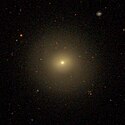NGC 3599
| Galaxie NGC 3599 | |
|---|---|
 | |
| SDSS-Aufnahme | |
| AladinLite | |
| Sternbild | Löwe |
| Position Äquinoktium: J2000.0, Epoche: J2000.0 | |
| Rektaszension | 11h 15m 26,9s[1] |
| Deklination | +18° 06′ 37″[1] |
| Erscheinungsbild | |
| Morphologischer Typ | SA0: / LINER[1] |
| Helligkeit (visuell) | 11,8 mag[2] |
| Helligkeit (B-Band) | 12,8 mag[2] |
| Winkelausdehnung | 2,7' × 2,1'[2] |
| Positionswinkel | 99°[2] |
| Flächenhelligkeit | 13,6 mag/arcmin²[2] |
| Physikalische Daten | |
| Rotverschiebung | 0.002799 ± 0.000017[1] |
| Radialgeschwindigkeit | (839 ± 5) km/s[1] |
| Hubbledistanz vrad / H0 | (35 ± 2) · 106 Lj (10,6 ± 0,7) Mpc [1] |
| Geschichte | |
| Entdeckung | Wilhelm Herschel |
| Entdeckungsdatum | 14. März 1784 |
| Katalogbezeichnungen | |
| NGC 3599 • UGC 6281 • PGC 34326 • CGCG 096-015 • MCG +03-29-015 • 2MASX J11152695+1806373 • GC 2352 • H II 49 • h 843 • LDCE 0778 NED027 | |
NGC 3599 ist eine linsenförmige Galaxie vom Hubble-Typ S0[2] im Sternbild Löwe auf der Ekliptik. Sie ist schätzungsweise 35 Millionen Lichtjahre von der Milchstraße entfernt.
Das Objekt wurde am 14. März 1784 von Wilhelm Herschel entdeckt.[3]
Weblinks
Einzelnachweise
Auf dieser Seite verwendete Medien
Autor/Urheber: Copyright © 2003 Torsten Bronger., Lizenz: CC BY-SA 3.0
This is a celestial map of the constellation Leo, the Lion.
Autor/Urheber: Sloan Digital Sky Survey, Lizenz: CC BY 4.0
The sky image is obtained by Sloan Digital Sky Survey, DR14 with SciServer.
Angle of view: 4' × 4' (0.3" per pixel), north is up.
Details on the image processing pipeline: https://www.sdss.org/dr14/imaging/jpg-images-on-skyserver/



